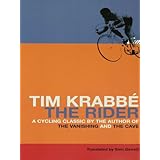The Rider by Tim Krabbé. Bloomsbury USA; Reprint edition 2003 (Originally published in the Netherlands in 1978).
The Rider wins my heart. This novel, by Tim Krabbé and translated from Dutch, is like watching a classic one-day race from inside the peleton. For anyone who’s ridden a bike competitively, or ridden “over your head” to keep up with buddies, or seen black from cranking up a hill so big you think it’ll kill you, you will understand this book. The translator Sam Garrett did a beautiful job because the language and metaphors are spot-on. Krabbé has nailed the physical and psychological agony and joy. Some gems:
Despuech, who has just made a break but obviously won’t stay away off the front.: Despuech is crazy. Despuech is only showing us that he doesn’t stand a chance in hell. He knows it too, but still it’s a fact: he has to choose between finishing at the back after shining, or finishing at the back after not having shone at all. Dozeas of riders are now thinking the word ‘Despuech’, and people along the route will clap for him. And later all the riders will slide right over him, like a net over an undersized fish.
 Gradually I find a cadence. Climbing is a rhythm, a trance; you have to rock your organs’ protests back to sleep.
Gradually I find a cadence. Climbing is a rhythm, a trance; you have to rock your organs’ protests back to sleep.I shift down. Forty-three nineteen: the gear of champions. How the hell do I keep talking myself into racing?
Gerrri Knetemann: “You guys need to suffer more, get dirtier; you should arrive at the top in a casket, that’s what we pay you for.”
Asked about the pain of getting dropped, Knetemann say, “It’s too bad, sir, but at a certain point you just can’t do it. And when can’t do it any more, you get dropped. Too bad. Nothing to make a fuss about.”
Perhaps I love this book so much because the protagonist narrating the story is a journalist/writer turned cyclist at age thirty. I fancy myself a combination of those two, so I particularly loved this little soliloquy: “I believed that, while cycling, I would come up with thoughts and ideas for the stories I’d be writing the rest of the time. Fat chance. The rest of my time I spent jotting in my cycling logbook and keeping statistics on my distance and times, and while cycling I thought of nothing at all.
Ha!!
Fear of heights, multiplied by my velocity. Don’t look to the side. The wind blows right through me…
Descents scare me, I’m the worst downhill rider here…
A sign. It says that the speed limit here is 60 kilometers per hour. My brain flashes a joke for my approval: point at that sign and waggle my finger at the others. Joke rejected.
Curves.
Yup. there we go.I think of coming down a mountain in Eastern Washington State in a small group ride from the The Bicycle Butler bike shop. Switchbacks and all, the pack flying. I was in my drops, aero, keeping up, and then--a switchback, I braked—out of instinct and self-preservation—I slowed, and I was dropped like a wounded bird from the flock.
...saw a rider meticulously peeling a banana with both hands on a downhill stretch at 65 kilometers an hour…
Comments like those about the “up-and coming Hinault” and anectodes of cycling history woven in the consciousness of the rider—the narrator—all in the course of a 150 km race make us as readers feel part of cycling history, part of this race in 1977
Who the hell goes cycling on a hot day like this?
The book’s opening will grab you, if you are one who identifies with the story, or if you are obsessive about any passion in your life. The narrator looks up from his gear at the spectators. "Non-racers…The emptiness of those lives shocks me."
Perhaps that’s the crux of it. When cycling becomes so central to our core that a life without it seems empty: there, I figured it out. That’s why I love this book so much.
No comments:
Post a Comment